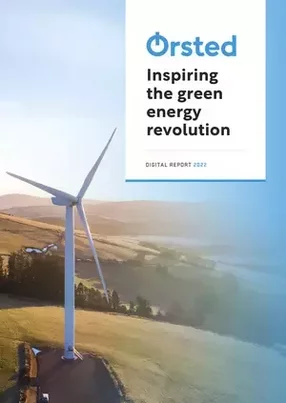Helping to create a world that runs entirely on green energy is the daily focus of Ida Krabek, Director, Head of Global Sustainability at Ørsted – a company that stands on the front line of climate action.
The title Head of Global Sustainability could appear daunting to most people, but Krabek is taking the challenge one small step at a time. She has been part of the sustainability journey at Ørsted for almost a decade, and has seen the company transform from a fossil fuel-based utility to a global green energy leader. They are now focused on helping create a world that runs entirely on green energy.
“The green transformation of the world is a massive undertaking, but it holds the power to be a major force for positive change,” said Krabek from her office in Copenhagen.
Danish-based Ørsted is a pioneering green energy company and the global leader in offshore wind. The company develops, constructs and operates renewable energy in the form of vast wind farms, solar farms, green hydrogen and energy storage facilities.
“We are on track to become a carbon neutral company and the next journey for us is to enable and inspire others to go through the same transformation, and with our green energy solutions we can help customers do that. Ørsted wants to be a catalyst for change towards a world that runs entirely on green energy.”
It may come as a surprise to learn that only a decade ago Ørsted - which was then called DONG Energy - was one of the most coal-intensive energy companies in Europe. Today, they have been crowned the most sustainable energy company in Corporate Knights’ 2021 Global 100 index of the most sustainable corporations.
“We’re the world leader in offshore wind. This means we have installed green power capacity to supply more than 15 million people with green energy and our ambition is to increase this figure to 30 million by 2025,” said Krabek who is keen to discuss how Ørsted has shaped its own sustainable future, how it is working to enable and inspire a world to run entirely on green energy and how she is collaborating with stakeholders to ensure the best outcomes for the planet and its people.
Phoenix from the ashes
Ørsted was founded in 1973 as DONG - which stood for Danish Oil and Natural Gas - and has risen like a phoenix from the ashes, dropping the original name and re-branding in 2017 in honour of the Danish physicist and chemist Hans Christian Ørsted, who inspired the electromagnetic theory.
“The objective was to transform our core business from fossil fuels to renewable energy. This has given us a business model that is long-term sustainable – both environmentally and financially,” said Krabek who has been with Ørsted since 2012. “I joined Ørsted because I saw a company that had a clear ambition to be a part of the solution when it came to addressing climate change and global warming.
“Back in 2009 our legacy business came under pressure due to new regulations for European energy markets. We also saw intensified public interest in climate and resistance to coal-fired power stations. We realised we had to change our business model to achieve long-term sustainability and a viable financial business model. But also looking ahead we believed the future of an energy company would be green energy. We then set the target to radically transform the company,” said Krabek.
Ørsted set their goal of transforming from 85% fossil-based energy production to 85% renewable energy production by 2040. “We reached that target in 2019, way ahead of what we had expected. Today, we are one of the world's biggest renewable energy companies, particularly in offshore wind.
“We may be a Danish company by heritage but we have a global presence. Our biggest offshore wind footprint is in north-west Europe including Denmark, Germany and the UK. We are extending that footprint to the US and the APAC region, including Japan and Taiwan, as we see a big potential for offshore wind in these areas.”
Ørsted, which is on track to be a carbon-neutral company by 2025 by reducing emissions from energy generations and operations by at least 98%, was recently awarded The Terra Carta Seal by HRH The Prince of Wales who said: “The Terra Carta Seal recognises those organisations which have made a serious commitment to a future that is much more sustainable, and puts Nature, People and the Planet at the heart of the economy.”
Ørsted listen to their stakeholders
“We listen a lot to our stakeholders,” commented Krabek, which she says is an intrinsic part of her team’s role. “You have to be curious and you have to genuinely listen to other people's perspectives, as that is what shapes sustainability.” She leads an empowered team at Ørsted to navigate the complex landscape of sustainability - as she points out “no single department or single person can do it alone”.
“We work as a team to make sure the company knows best practices and we look at how the sustainability space is moving and then work with relevant business functions across the organisation to make sure we have the right programmes and initiatives in place.
“We are very focused on what our different stakeholder expectations are relating to sustainability from investors, non-profit organisations (NGOs), local communities, the regulators or governments, who ask for the energy project and are our main customers.”
Krabek points out that renewable energy projects such as wind farms rely on a huge infrastructure which, in many cases, will become a significant part of local communities.
“We are committed to engaging in early dialogue with local communities, to understand both the perspectives and also the concerns and interest they have in the project that we are going to embark upon together. We want the projects to create shared benefits for us as a company and for the local community, so understanding their concerns and interests is something we pay close attention to wherever we build,” she said.
“The green energy transition has the capability to be a driver for local job creation and growth, but it requires relevant job skills within those communities.”
Working with the community
One example of this is the UK town of Grimsby, which was once in decline after the fishing industry slowed down. Offshore wind has given the small town new opportunities and new hope, helping to build a sustainable future for the local people and creating renewable energy jobs in their hometown.
“We have a partnership with the Grimsby Institute and Further Education College to deliver a three-year wind turbine technician apprenticeship team. This is just one example of how we can partner with a community for a positive shared outcome.”
Ørsted has also joined forces with national youth charity OnSide in a new partnership and will invest £1 million in a Youth Zone that will support thousands of young people in Grimsby as part of the town’s ambitious regeneration plans. The dedicated facility will offer long-term opportunities to learn and develop skills.
Sustainable supply chain
Ørsted leads by example and is currently focusing on making its own supply chains more sustainable, especially when it comes to the manufacture and transportation needed to construct a wind farm.
Speaking on how Ørsted is working to overcome the challenges with their own supply chain, Krabek said this was the next stage of their own decarbonisation journey and is calling on suppliers to disclose emissions and develop roadmaps for progress.
“We have set a target of net-zero emissions from our supply chain by 2040 so we need to bring down supply chain emissions while scaling our green energy business, and this will not be an easy task. As a company, we don't have direct control over these emissions.”
Krabek pointed out that Ørsted is the first energy company globally to have its net-zero target for the full value chain approved by the Science-based Targets Initiative. “We have clear emission reductions targets in place for our full value chain, but we are dependent on the energy industry succeeding with moving towards that 2040 target. That’s why it's a challenge – because you cannot solve it on your own.
“The majority of our supply chain emissions come from offshore wind and 50% of the emissions related to offshore wind are related to steel. Those emissions take place further down the supply chain,” said Krabek, who pointed out they are collaborating with suppliers and are focused on increasing the demand for green steel through the SteelZero initiative.
Protecting the environment
Wind farms are major infrastructure projects, but Krabek stresses that “green industry has to go hand-in-hand with the protection of natural habitats both on land and sea.”
“This is because climate change and global warming is not the only crisis we as a world have to deal with. We see a biodiversity crisis unfolding, with more than two-thirds of species being lost over the past 50 years, so we have to make sure the green transformation takes place in balance with nature.
“We have set a target that by 2030 at the latest, all of the energy projects we commission must have a net positive impact on biodiversity. You may ask how we are going to do that? We set this ambition even though we don't have all the answers. We are among other things starting to look into what type of projects can deliver in the short-term, so that we get the experience to learn how we can systematically build this into our pipeline of projects. That’s what sustainability leadership is also about. You have to set the targets and ambitions even if you don’t have all the answers.”
As part of its climate change advocacy, Ørsted is sponsoring the Wildlife Photographer of the Year exhibition in partnership with the Natural History Museum in London. Krabek commented that the longest running photographic event in the world, which showcases animals in their natural habitat, is “an obvious fit for us because it is an institution that helps to educate people in sustainability and the importance of nature”.
Power to make systemic changes
Ørsted may be driving the vision of a green future, but Krabek highlighted the fact that ultimately change is “driven by humans”.
“We all have a role to play in delivering that change through personal choices on transportation and food. But I think the more interesting question is really what can you do to create systemic changes that need to take place? If you work in an organisation, what can you do to push that company to be part of that change? This is all needed to progress the sustainability agenda and limit global warming over the next decade.”
Commenting on the future Krabek said: “Renewable energy will have to accelerate drastically over the coming decade. At COP26 there were a number of positive outcomes, but it is not enough as the national commitments do not add up to what we need to limit global warming to 1.5 degrees. We have to meet that golden limit because going beyond will mean catastrophic and uncontrollable global warming.”
If the world can achieve what Ørsted has done in the past 10 years we will all be in a better place.
Ørsted receives HRH The Prince of Wales’ Terra Carta Seal
Ørsted has been awarded the Terra Carta Seal. The inaugural 2021 Terra Carta Seal recognises global companies which are driving innovation and demonstrating their commitment to, and momentum towards, the creation of genuinely sustainable markets.
It is awarded to companies whose ambitions are aligned with those of the Terra Carta, a recovery plan for Nature, People and Planet, launched in January 2021.
HRH The Prince of Wales was deeply encouraged by Ørsted’s commitment to reducing its scope 1 and 2 greenhouse gas emissions (GHG) by 98% per kWh by 2025 (from a 2006 base year), reducing its scope 3 emissions by 50% by 2032 (from a 2018 base year), and achieving net-zero GHG/CO2e emissions across its value chain by 2040.
“We all need to make changes if we are to preserve the planet for our children and grandchildren and these businesses have pledged to make it easier for us all to do so,” said HRH The Prince of Wales.
Ida Krabek, Director, Head of Global Sustainability at Ørsted, said: “We are proud of the Terra Carta Seal as it recognises companies that are committed to putting sustainability at the core of their business and showing the way in how to create a more sustainable world.”
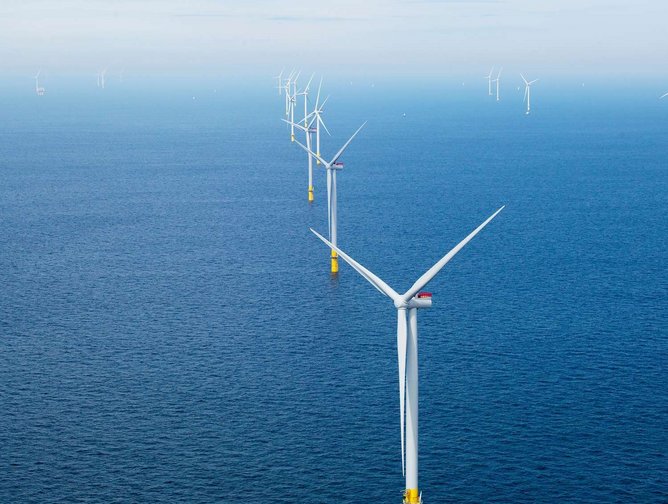
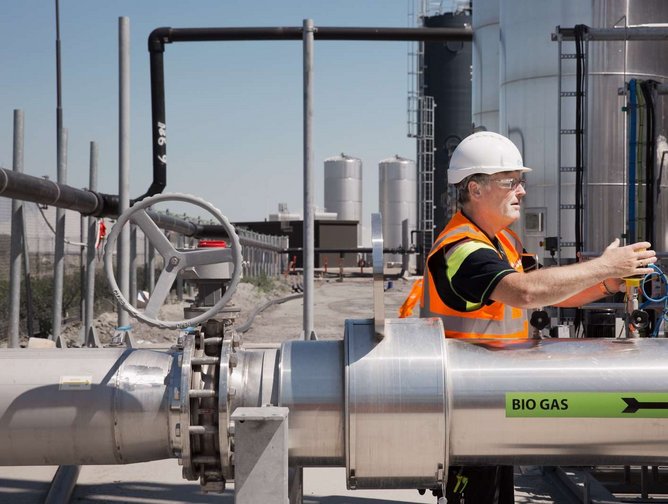
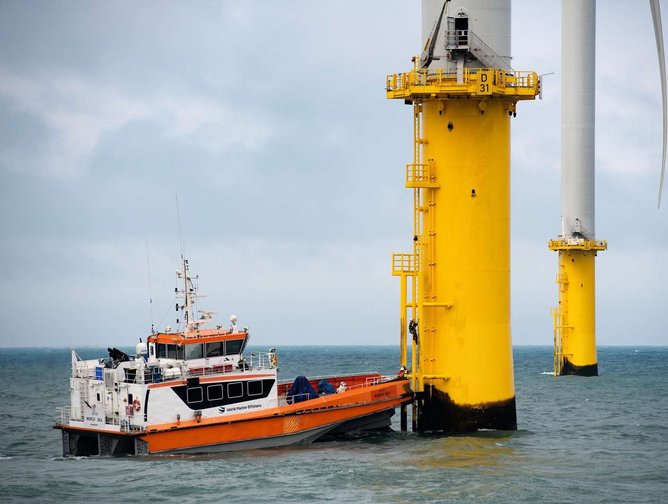
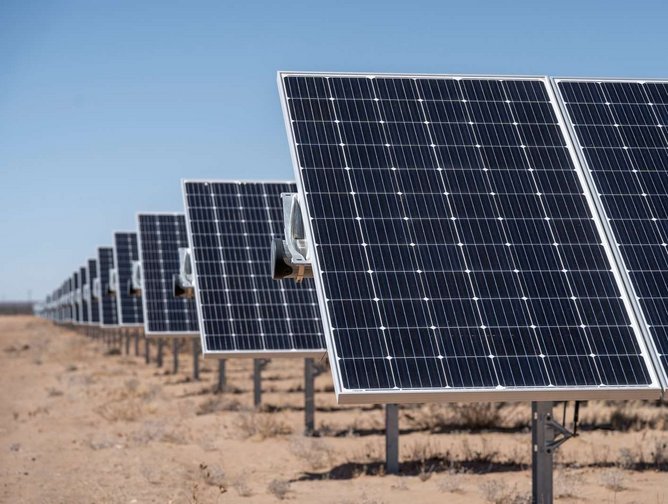
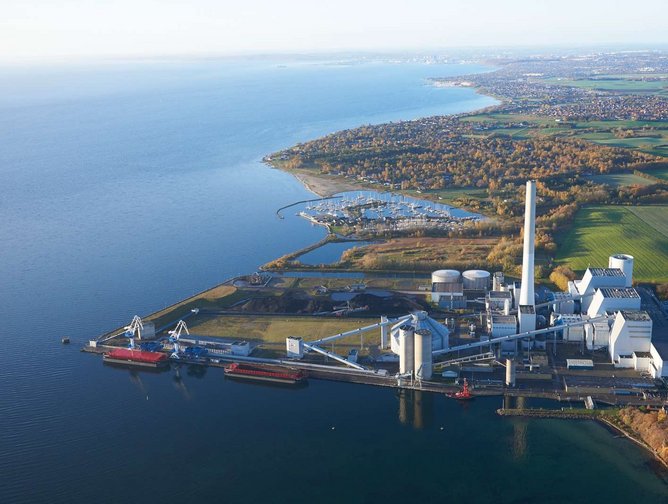
- How SOL PV helped Central Co-op become a greener businessSupply Chain Sustainability
- How SOL PV helped Central Co-op become a greener businessSupply Chain Sustainability
- Signify’s Harry Verhaar on renewable energy transitionRenewable Energy
- Smart tech can boost business sustainability in 6 key areasSustainability

